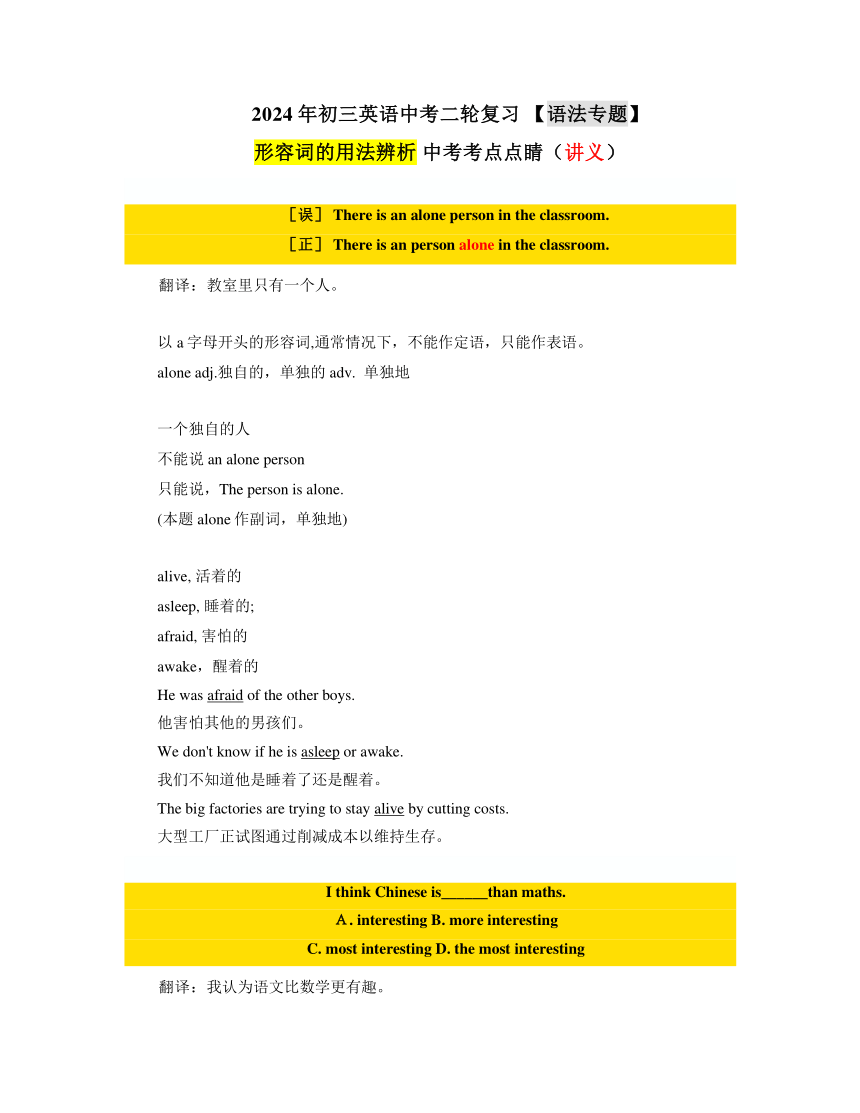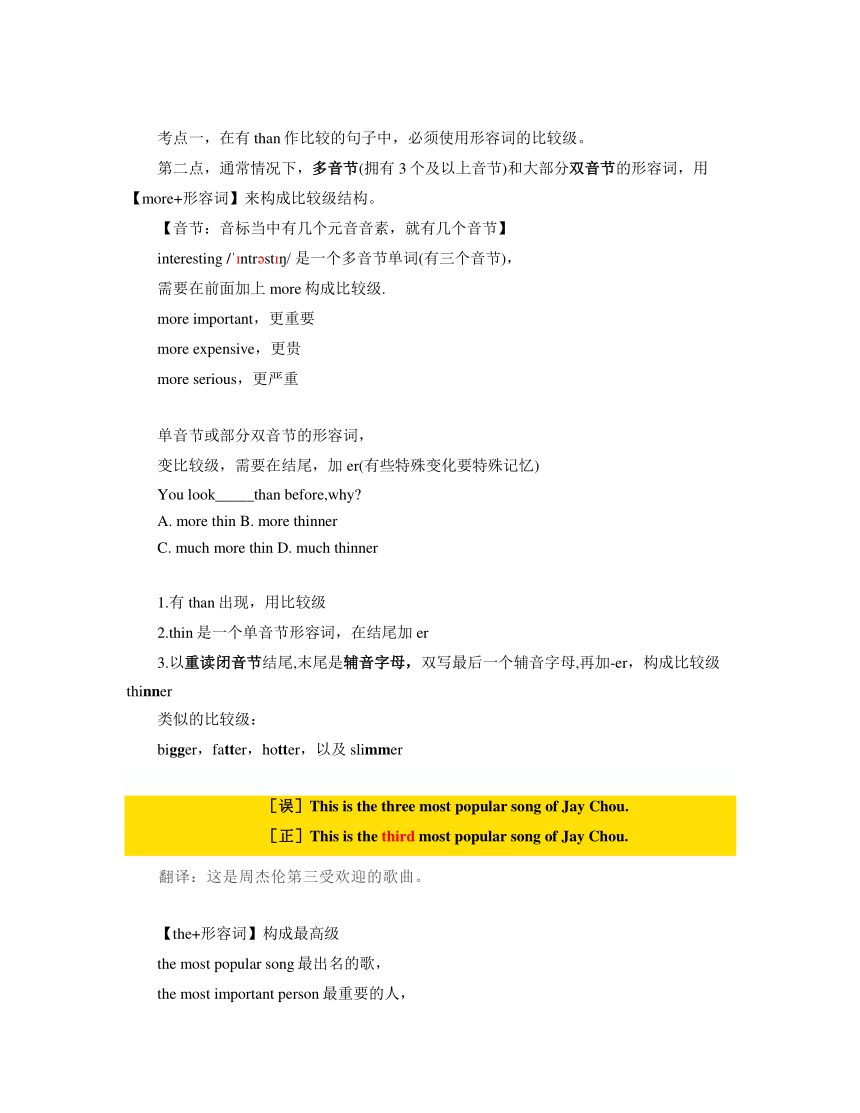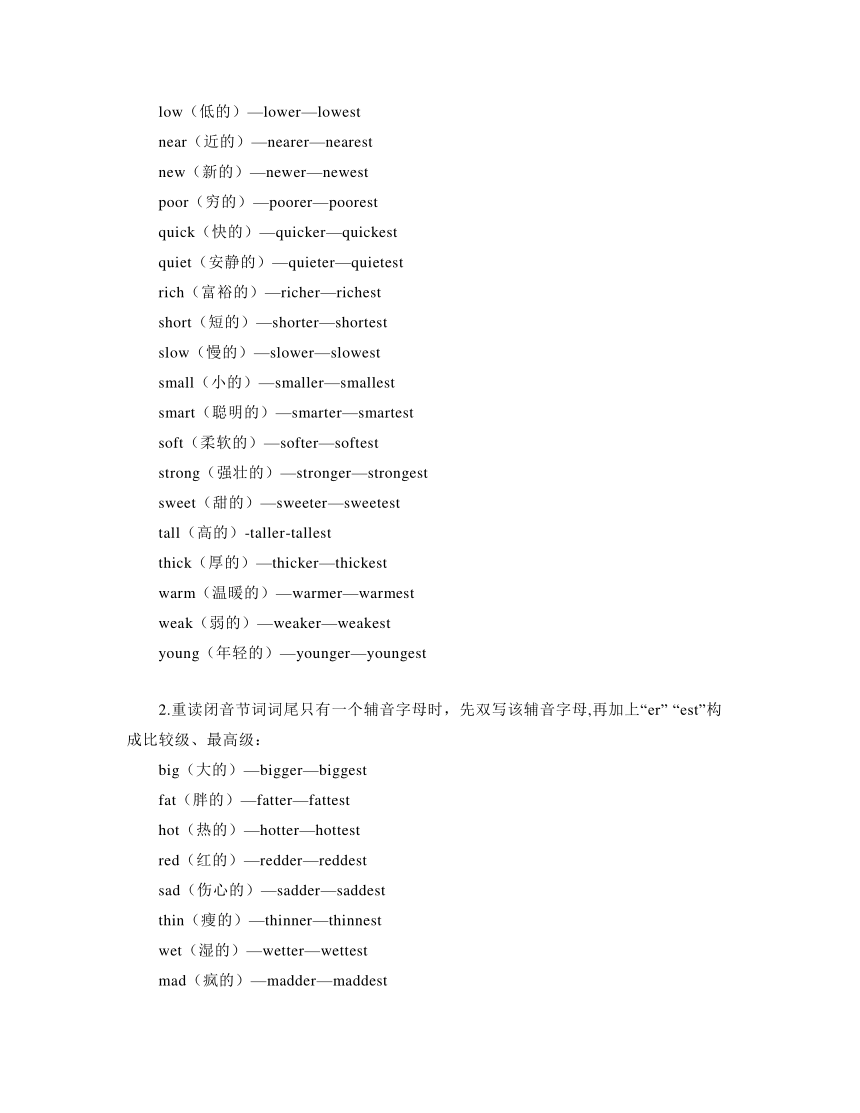2024年中考英语二轮复习 语法专题形容词的用法辨析 中考考点点睛(讲义)
文档属性
| 名称 | 2024年中考英语二轮复习 语法专题形容词的用法辨析 中考考点点睛(讲义) |

|
|
| 格式 | docx | ||
| 文件大小 | 24.0KB | ||
| 资源类型 | 教案 | ||
| 版本资源 | 通用版 | ||
| 科目 | 英语 | ||
| 更新时间 | 2024-03-04 00:00:00 | ||
图片预览




文档简介
2024年初三英语中考二轮复习 【语法专题】
形容词的用法辨析 中考考点点睛(讲义)
[误] There is an alone person in the classroom.
[正] There is an person alone in the classroom.
翻译:教室里只有一个人。
以a字母开头的形容词,通常情况下,不能作定语,只能作表语。
alone adj.独自的,单独的 adv. 单独地
一个独自的人
不能说an alone person
只能说,The person is alone.
(本题alone作副词,单独地)
alive, 活着的
asleep, 睡着的;
afraid, 害怕的
awake,醒着的
He was afraid of the other boys.
他害怕其他的男孩们。
We don't know if he is asleep or awake.
我们不知道他是睡着了还是醒着。
The big factories are trying to stay alive by cutting costs.
大型工厂正试图通过削减成本以维持生存。
I think Chinese is______than maths.
A. interesting B. more interesting
C. most interesting D. the most interesting
翻译:我认为语文比数学更有趣。
考点一,在有than作比较的句子中,必须使用形容词的比较级。
第二点,通常情况下,多音节(拥有3个及以上音节)和大部分双音节的形容词,用【more+形容词】来构成比较级结构。
【音节:音标当中有几个元音音素,就有几个音节】
interesting / ntr st / 是一个多音节单词(有三个音节),
需要在前面加上more构成比较级.
more important,更重要
more expensive,更贵
more serious,更严重
单音节或部分双音节的形容词,
变比较级,需要在结尾,加er(有些特殊变化要特殊记忆)
You look_____than before,why
A. more thin B. more thinner
C. much more thin D. much thinner
1.有than出现,用比较级
2.thin是一个单音节形容词,在结尾加er
3.以重读闭音节结尾,末尾是辅音字母,双写最后一个辅音字母,再加-er,构成比较级thinner
类似的比较级:
bigger,fatter,hotter,以及slimmer
[误]This is the three most popular song of Jay Chou.
[正]This is the third most popular song of Jay Chou.
翻译:这是周杰伦第三受欢迎的歌曲。
【the+形容词】构成最高级
the most popular song最出名的歌,
the most important person最重要的人,
the most beautiful girl最漂亮的女孩,
【the+序数词+形容词】】the second most popular person,第二出名的人。the third most beautiful girl,第三漂亮的女孩,
She is the second smartest girl in our class.
她是我们班第二聪明的女生。
He is the third richest person in China.
他是中国第三富有的。
形容词一般变化&特殊变化规律
单音节词和部分双音节词的变化规则
1.一般情况下,在形容词词尾加上“er”“est”构成比较级、最高级
bright(明亮的)—brighter—brightest
broad(广阔的)—broader—broadest
cheap(便宜的)—cheaper—cheapest
clean(干净的)—cleaner—cleanest
clever(聪明的)—cleverer—cleverest
cold(寒冷的)—colder—coldest
cool(凉的)—cooler—coolest
dark(黑暗的)—darker—darkest
dear(贵的)—dearer—dearest
deep(深的)—deeper—deepest
fast(迅速的)—faster—fastest
few(少的)—fewer—fewest
great(伟大的)—greater—greatest
hard(困难的,硬的)—harder—hardest
high(高的)—higher—highest
kind(善良的)—kinder—kindest
light(轻的)—lighter—lightest
long(长的)—longer—longest
loud(响亮的)—louder—loudest
low(低的)—lower—lowest
near(近的)—nearer—nearest
new(新的)—newer—newest
poor(穷的)—poorer—poorest
quick(快的)—quicker—quickest
quiet(安静的)—quieter—quietest
rich(富裕的)—richer—richest
short(短的)—shorter—shortest
slow(慢的)—slower—slowest
small(小的)—smaller—smallest
smart(聪明的)—smarter—smartest
soft(柔软的)—softer—softest
strong(强壮的)—stronger—strongest
sweet(甜的)—sweeter—sweetest
tall(高的)-taller-tallest
thick(厚的)—thicker—thickest
warm(温暖的)—warmer—warmest
weak(弱的)—weaker—weakest
young(年轻的)—younger—youngest
2.重读闭音节词词尾只有一个辅音字母时,先双写该辅音字母,再加上“er” “est”构成比较级、最高级:
big(大的)—bigger—biggest
fat(胖的)—fatter—fattest
hot(热的)—hotter—hottest
red(红的)—redder—reddest
sad(伤心的)—sadder—saddest
thin(瘦的)—thinner—thinnest
wet(湿的)—wetter—wettest
mad(疯的)—madder—maddest
3.以不发音的字母e结尾的形容词,加上“r” “st” 构成比较级、最高级:
able(能干的)—abler—ablest
brave(勇敢的)—braver—bravest
close(接近的)—closer—closest
fine(好的,完美的)—finer—finest
large(巨大的)—larger—largest
late(迟的)—later—latest
nice(好的)—nicer—nicest ripe(成熟的)—riper—ripest
rude(粗鲁的)—ruder—rudest
safe(安全的)—safer—safest
strange(奇怪的)—stranger—strangest
wide(宽广的)—wider—widest
wise(睿智的,聪明的)—wiser—wisest
white(白的)—whiter—whitest
4.以字母“辅音字母+y”结尾的双音节词,把y改为i,再加上“er”“est”构成比较级、最高级:
busy(忙碌的)—busier—busiest
dirty(脏的)—dirtier—dirtiest
dry(干燥的)—drier—driest
early(早的)—earlier—earliest
easy(容易的)—easier—easiest
friendly(友好的)—friendlier—friendliest
funny(好玩的)—funnier—funniest
happy(开心的)—happier—happiest
healthy(健康的)—healthier—healthiest
heavy(重的)—heavier—heaviest
hungry(饿的)—hungrier—hungriest
lazy(懒惰的)—lazier—laziest
lucky(幸运的)—luckier—luckiest
naughty(调皮的)—naughtier—naughtiest
noisy(嘈杂的)—noisier—noisiest
pretty(美丽的)—prettier—prettiest
silly(傻的)—sillier—silliest
spicy(辣的)—spicier—spiciest
thirsty(渴的)—thirstier—thirstiest
ugly(丑的)—uglier—ugliest
部分双音节词和多音节词的变化规律
5.在单词前面加上“more” 或“most”构成比较级或最高级:
afraid(害怕的)—more afraid—most afraid
beautiful(美丽的)—more beautiful—most beautiful
careful(仔细的)—more careful—most careful
cheerful(开心的)—more cheerful—most cheerful
crowded(拥挤的)—more crowded—most crowded
dangerous(危险的)—more dangerous—most dangerous
delicious(美味的)—more delicious—most delicious
difficult(困难的)—more difficult—most difficult
exciting(令人兴奋的)—more exciting—most exciting
expensive(昂贵的)—more expensive—most expensive
famous(著名的)—more famous—most famous
frightened(受惊的)—more frightened—most frightened
frightening(令人害怕的)—more frightening—most frightening
hard-working(勤奋的)—more hard-working—most hard-working
helpful(有帮助的)—more helpful—most helpful
honest(诚实的)—more honest—most honest
important(重要的)—important—most important
interesting(有趣的)—more interesting—most interesting
polite(有礼貌的)—more polite—most polite
terrible(可怕的)—more terrible—most terrible
tired(累的)—more tired—most tired
6.不规则变化的形容词和副词:
bad(坏的)—worse—worst
far(远的)—farther—farthest (far—further—furthest)
good(好的)—better—best
ill(病的)—worse—worst
little(少的)—less—least
many(多的)—more—most
much(多的)—more—most
old(年老的)—older—oldest ( old—elder—eldest)
well(好的,身体好的)—better—best
考点点睛
在英语当中,形容词的使用,是要遵循一定的规则的,比如说在中学范围内,咱们所学到的,那些以a字母开头的形容词,通常情况下,不能作定语,只能作表语。说白了其实就是,这类形容词,只能放在be动词的后面,而不能出现在名词的前面。比如说第一个句子,There is an person alone in the classroom.我们说alone这个词,它有一层意思是,独自的。但是当我们要表达,一个独自的人时,就不能说an alone person。我们只能说,The person is alone.类似的形容词还有像是:alive, asleep, afraid, awake等等,都是这个规则。比如He was afraid of the other boys.他害怕其他的男孩们。We don't know if he is asleep or awake我们不知道他是睡着了还是醒着,The big factories are trying to stay alive by cutting costs大型工厂正试图通过削减成本以维持生存。等等。都是这个规律。
再看第二题,I think Chinese is more interesting than maths.我认为语文比数学更有趣。我们说,本道题的考点有两个,第一,在有than作比较的句子中,我们必须要使用,形容词的比较级。第二点,通常情况下,那些多音节(拥有3个及以上音节)和大部分双音节的形容词,会用more加形容词来构成比较级结构。在本题当中,interesting是一个多音节的单词,因此需要在前面加上more构成比较级,就可以了。而类似的用法像是,more important,more expensive,以及,more serious,等等,都是比较级结构。而反过来,如果只是单音节或部分双音节的形容词,往往变比较级,只需要在结尾,加er,就可以了。比如咱们再看这道题,You look much thinner than before,why 你看起来比以前瘦多了,我们说,首先,有than出现,我们要用比较级,其次,thin是一个单音节形容词,所以我们只用在结尾加er便可以了,但是本道题还有第三个考点,那就是,像thin这种,以重读闭音节结尾,且末尾是一个辅音字母的形容词,在变成比较级的时候,还需要双写最后一个辅音字母,再加-er,因此也就有了,thinner,这个词。而类似的比较级形容词像是bigger,fatter,hotter,以及slimmer、等等,都是这个规律。
接着咱们看第三题,This is the third most popular song of Jay Chou.这是周杰伦第三出名的歌,我们知道,如果表达定冠词the加形容词最高级,就可以表达,一个最怎么样的东西了,比如the most popular song最出名的歌,the most important person最重要的人,以及,the most beautiful girl最漂亮的女孩。等等,但是,如果你在大家眼里,不是最出名的人,你只是第二出名,或者第三出名,应该怎么表达呢,其实很简单,我们用the和最高级形容词之间,加上一个序数词,就可以了,比如,the second most popular person,第二出名的人。the third most beautiful girl,第三漂亮的女孩,咱们看这个例句,She is the second smartest girl in our class.她是我们班第二聪明的女生。再比如,He is the third richest person in China.他是中国第三富有的人。等等,他都是这个用法。而另外一点,我们得知道,任何形容最怎么样的用法,顶多多也就取前三名来表达,你是最出名的,你是第二出名,最多再有,你是第三出名,很少有人再去争第四出名,第五出名,等等。因此,我们说这种表达,只能用到the third most,也就到头了,这一点,咱们要牢记。
形容词的用法辨析 中考考点点睛(讲义)
[误] There is an alone person in the classroom.
[正] There is an person alone in the classroom.
翻译:教室里只有一个人。
以a字母开头的形容词,通常情况下,不能作定语,只能作表语。
alone adj.独自的,单独的 adv. 单独地
一个独自的人
不能说an alone person
只能说,The person is alone.
(本题alone作副词,单独地)
alive, 活着的
asleep, 睡着的;
afraid, 害怕的
awake,醒着的
He was afraid of the other boys.
他害怕其他的男孩们。
We don't know if he is asleep or awake.
我们不知道他是睡着了还是醒着。
The big factories are trying to stay alive by cutting costs.
大型工厂正试图通过削减成本以维持生存。
I think Chinese is______than maths.
A. interesting B. more interesting
C. most interesting D. the most interesting
翻译:我认为语文比数学更有趣。
考点一,在有than作比较的句子中,必须使用形容词的比较级。
第二点,通常情况下,多音节(拥有3个及以上音节)和大部分双音节的形容词,用【more+形容词】来构成比较级结构。
【音节:音标当中有几个元音音素,就有几个音节】
interesting / ntr st / 是一个多音节单词(有三个音节),
需要在前面加上more构成比较级.
more important,更重要
more expensive,更贵
more serious,更严重
单音节或部分双音节的形容词,
变比较级,需要在结尾,加er(有些特殊变化要特殊记忆)
You look_____than before,why
A. more thin B. more thinner
C. much more thin D. much thinner
1.有than出现,用比较级
2.thin是一个单音节形容词,在结尾加er
3.以重读闭音节结尾,末尾是辅音字母,双写最后一个辅音字母,再加-er,构成比较级thinner
类似的比较级:
bigger,fatter,hotter,以及slimmer
[误]This is the three most popular song of Jay Chou.
[正]This is the third most popular song of Jay Chou.
翻译:这是周杰伦第三受欢迎的歌曲。
【the+形容词】构成最高级
the most popular song最出名的歌,
the most important person最重要的人,
the most beautiful girl最漂亮的女孩,
【the+序数词+形容词】】the second most popular person,第二出名的人。the third most beautiful girl,第三漂亮的女孩,
She is the second smartest girl in our class.
她是我们班第二聪明的女生。
He is the third richest person in China.
他是中国第三富有的。
形容词一般变化&特殊变化规律
单音节词和部分双音节词的变化规则
1.一般情况下,在形容词词尾加上“er”“est”构成比较级、最高级
bright(明亮的)—brighter—brightest
broad(广阔的)—broader—broadest
cheap(便宜的)—cheaper—cheapest
clean(干净的)—cleaner—cleanest
clever(聪明的)—cleverer—cleverest
cold(寒冷的)—colder—coldest
cool(凉的)—cooler—coolest
dark(黑暗的)—darker—darkest
dear(贵的)—dearer—dearest
deep(深的)—deeper—deepest
fast(迅速的)—faster—fastest
few(少的)—fewer—fewest
great(伟大的)—greater—greatest
hard(困难的,硬的)—harder—hardest
high(高的)—higher—highest
kind(善良的)—kinder—kindest
light(轻的)—lighter—lightest
long(长的)—longer—longest
loud(响亮的)—louder—loudest
low(低的)—lower—lowest
near(近的)—nearer—nearest
new(新的)—newer—newest
poor(穷的)—poorer—poorest
quick(快的)—quicker—quickest
quiet(安静的)—quieter—quietest
rich(富裕的)—richer—richest
short(短的)—shorter—shortest
slow(慢的)—slower—slowest
small(小的)—smaller—smallest
smart(聪明的)—smarter—smartest
soft(柔软的)—softer—softest
strong(强壮的)—stronger—strongest
sweet(甜的)—sweeter—sweetest
tall(高的)-taller-tallest
thick(厚的)—thicker—thickest
warm(温暖的)—warmer—warmest
weak(弱的)—weaker—weakest
young(年轻的)—younger—youngest
2.重读闭音节词词尾只有一个辅音字母时,先双写该辅音字母,再加上“er” “est”构成比较级、最高级:
big(大的)—bigger—biggest
fat(胖的)—fatter—fattest
hot(热的)—hotter—hottest
red(红的)—redder—reddest
sad(伤心的)—sadder—saddest
thin(瘦的)—thinner—thinnest
wet(湿的)—wetter—wettest
mad(疯的)—madder—maddest
3.以不发音的字母e结尾的形容词,加上“r” “st” 构成比较级、最高级:
able(能干的)—abler—ablest
brave(勇敢的)—braver—bravest
close(接近的)—closer—closest
fine(好的,完美的)—finer—finest
large(巨大的)—larger—largest
late(迟的)—later—latest
nice(好的)—nicer—nicest ripe(成熟的)—riper—ripest
rude(粗鲁的)—ruder—rudest
safe(安全的)—safer—safest
strange(奇怪的)—stranger—strangest
wide(宽广的)—wider—widest
wise(睿智的,聪明的)—wiser—wisest
white(白的)—whiter—whitest
4.以字母“辅音字母+y”结尾的双音节词,把y改为i,再加上“er”“est”构成比较级、最高级:
busy(忙碌的)—busier—busiest
dirty(脏的)—dirtier—dirtiest
dry(干燥的)—drier—driest
early(早的)—earlier—earliest
easy(容易的)—easier—easiest
friendly(友好的)—friendlier—friendliest
funny(好玩的)—funnier—funniest
happy(开心的)—happier—happiest
healthy(健康的)—healthier—healthiest
heavy(重的)—heavier—heaviest
hungry(饿的)—hungrier—hungriest
lazy(懒惰的)—lazier—laziest
lucky(幸运的)—luckier—luckiest
naughty(调皮的)—naughtier—naughtiest
noisy(嘈杂的)—noisier—noisiest
pretty(美丽的)—prettier—prettiest
silly(傻的)—sillier—silliest
spicy(辣的)—spicier—spiciest
thirsty(渴的)—thirstier—thirstiest
ugly(丑的)—uglier—ugliest
部分双音节词和多音节词的变化规律
5.在单词前面加上“more” 或“most”构成比较级或最高级:
afraid(害怕的)—more afraid—most afraid
beautiful(美丽的)—more beautiful—most beautiful
careful(仔细的)—more careful—most careful
cheerful(开心的)—more cheerful—most cheerful
crowded(拥挤的)—more crowded—most crowded
dangerous(危险的)—more dangerous—most dangerous
delicious(美味的)—more delicious—most delicious
difficult(困难的)—more difficult—most difficult
exciting(令人兴奋的)—more exciting—most exciting
expensive(昂贵的)—more expensive—most expensive
famous(著名的)—more famous—most famous
frightened(受惊的)—more frightened—most frightened
frightening(令人害怕的)—more frightening—most frightening
hard-working(勤奋的)—more hard-working—most hard-working
helpful(有帮助的)—more helpful—most helpful
honest(诚实的)—more honest—most honest
important(重要的)—important—most important
interesting(有趣的)—more interesting—most interesting
polite(有礼貌的)—more polite—most polite
terrible(可怕的)—more terrible—most terrible
tired(累的)—more tired—most tired
6.不规则变化的形容词和副词:
bad(坏的)—worse—worst
far(远的)—farther—farthest (far—further—furthest)
good(好的)—better—best
ill(病的)—worse—worst
little(少的)—less—least
many(多的)—more—most
much(多的)—more—most
old(年老的)—older—oldest ( old—elder—eldest)
well(好的,身体好的)—better—best
考点点睛
在英语当中,形容词的使用,是要遵循一定的规则的,比如说在中学范围内,咱们所学到的,那些以a字母开头的形容词,通常情况下,不能作定语,只能作表语。说白了其实就是,这类形容词,只能放在be动词的后面,而不能出现在名词的前面。比如说第一个句子,There is an person alone in the classroom.我们说alone这个词,它有一层意思是,独自的。但是当我们要表达,一个独自的人时,就不能说an alone person。我们只能说,The person is alone.类似的形容词还有像是:alive, asleep, afraid, awake等等,都是这个规则。比如He was afraid of the other boys.他害怕其他的男孩们。We don't know if he is asleep or awake我们不知道他是睡着了还是醒着,The big factories are trying to stay alive by cutting costs大型工厂正试图通过削减成本以维持生存。等等。都是这个规律。
再看第二题,I think Chinese is more interesting than maths.我认为语文比数学更有趣。我们说,本道题的考点有两个,第一,在有than作比较的句子中,我们必须要使用,形容词的比较级。第二点,通常情况下,那些多音节(拥有3个及以上音节)和大部分双音节的形容词,会用more加形容词来构成比较级结构。在本题当中,interesting是一个多音节的单词,因此需要在前面加上more构成比较级,就可以了。而类似的用法像是,more important,more expensive,以及,more serious,等等,都是比较级结构。而反过来,如果只是单音节或部分双音节的形容词,往往变比较级,只需要在结尾,加er,就可以了。比如咱们再看这道题,You look much thinner than before,why 你看起来比以前瘦多了,我们说,首先,有than出现,我们要用比较级,其次,thin是一个单音节形容词,所以我们只用在结尾加er便可以了,但是本道题还有第三个考点,那就是,像thin这种,以重读闭音节结尾,且末尾是一个辅音字母的形容词,在变成比较级的时候,还需要双写最后一个辅音字母,再加-er,因此也就有了,thinner,这个词。而类似的比较级形容词像是bigger,fatter,hotter,以及slimmer、等等,都是这个规律。
接着咱们看第三题,This is the third most popular song of Jay Chou.这是周杰伦第三出名的歌,我们知道,如果表达定冠词the加形容词最高级,就可以表达,一个最怎么样的东西了,比如the most popular song最出名的歌,the most important person最重要的人,以及,the most beautiful girl最漂亮的女孩。等等,但是,如果你在大家眼里,不是最出名的人,你只是第二出名,或者第三出名,应该怎么表达呢,其实很简单,我们用the和最高级形容词之间,加上一个序数词,就可以了,比如,the second most popular person,第二出名的人。the third most beautiful girl,第三漂亮的女孩,咱们看这个例句,She is the second smartest girl in our class.她是我们班第二聪明的女生。再比如,He is the third richest person in China.他是中国第三富有的人。等等,他都是这个用法。而另外一点,我们得知道,任何形容最怎么样的用法,顶多多也就取前三名来表达,你是最出名的,你是第二出名,最多再有,你是第三出名,很少有人再去争第四出名,第五出名,等等。因此,我们说这种表达,只能用到the third most,也就到头了,这一点,咱们要牢记。
同课章节目录
- 词法
- 名词
- 动词和动词短语
- 动词语态
- 动词时态
- 助动词和情态动词
- 非谓语动词
- 冠词
- 代词
- 数词和量词
- 形容词副词及其比较等级
- 介词和介词短语
- 连词和感叹词
- 构词法
- 相似、相近词比较
- 句法
- 陈述句
- 一般疑问句和否定疑问句
- 特殊疑问句及选择疑问句
- 反意疑问句
- 存在句(There be句型)
- 宾语从句
- 定语从句
- 状语从句
- 主谓一致问题
- 简单句
- 并列句
- 复合句
- 主谓一致
- 主、表语从句
- 名词性从句
- 直接引语和间接引语
- 虚拟语气
- 感叹句
- 强调句
- 倒装句
- 祈使句
- 句子的成分
- 句子的分类
- 题型专区
- 单项选择部分
- 易错题
- 完形填空
- 阅读理解
- 词汇练习
- 听说训练
- 句型转换
- 补全对话
- 短文改错
- 翻译
- 书面表达
- 任务型阅读
- 语法填空
- 其他资料
